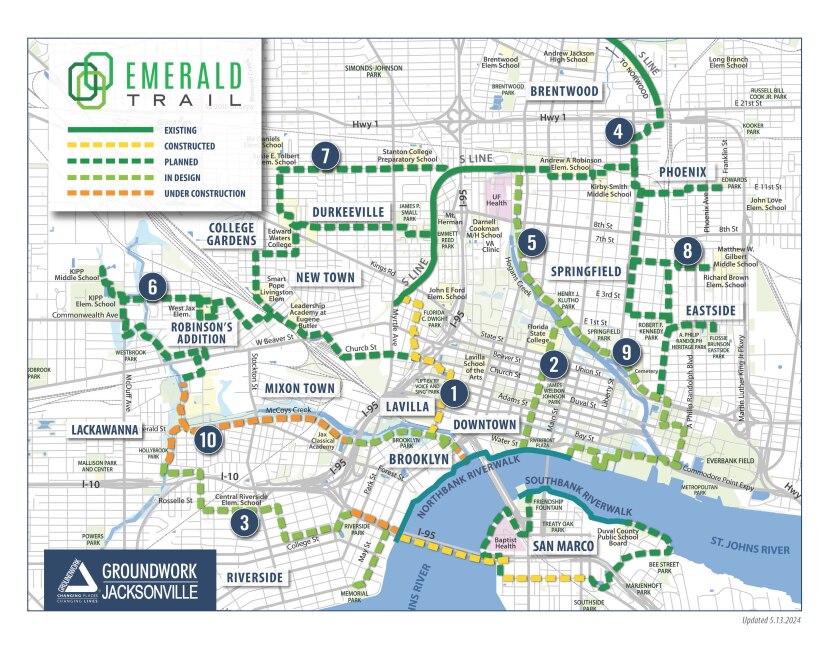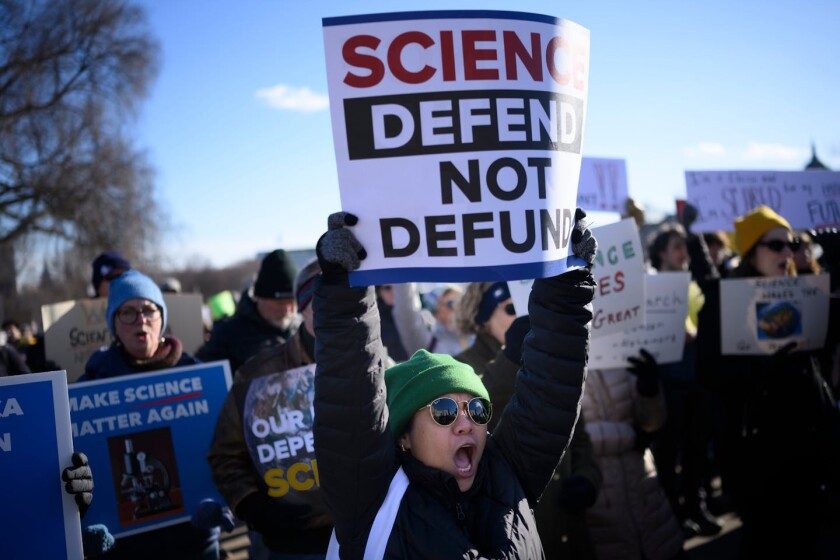In Brief:
- Jacksonville, Fla., was awarded $147 million to complete a transportation project but will get $0 after Congress voted to rescind unobligated funds.
- The rescissions affected the Neighborhood Access and Equity program included in the Inflation Reduction Act of 2022.
- About 75 percent of the $3.2 billion in funding was still unobligated.
Jacksonville got the good news in March 2024. The U.S. Department of Transportation announced a $147 million grant award to help the city complete the remaining segments of the Emerald Trail, a years-in-the-making infrastructure project connecting a series of neighborhoods surrounding downtown Jacksonville. The project, a collaboration with the Jacksonville Transportation Authority and the nonprofit Groundwork Jacksonville, grew out of efforts to restore a series of creeks and reduce flooding. It’s meant to provide new links between urban neighborhoods and promote economic growth. The grant was awarded under the $3.2 billion Neighborhood Access and Equity program established by the Inflation Reduction Act of 2022. It was the biggest federal grant Jacksonville had ever been awarded.
But before the grant could be executed, the White House changed hands. Under President Donald Trump, many federal agencies are cutting staff and looking to rein in spending, while the Republican-controlled Congress is reviewing spending decisions made by the Biden administration. Programs that appear to promote “DEI” (diversity, equity and inclusion) or “equity” have been special targets. Earlier this month, as part of the One Big Beautiful Bill Act, Congress voted to rescind all the unobligated funds awarded under the Neighborhood Access and Equity program. That means all the money that wasn’t subject to a signed grant agreement between the federal government and the local recipient. (Grants are awarded all at once but funds can be obligated in phases, and at different paces.) In Jacksonville’s case that was the entire grant; instead of $147 million for the project, it will get $0.
Local officials have expressed disappointment about the grant’s rescission even as they say the project will continue — potentially with additional federal grants and other fundraising efforts. Matt Carlucci, a Jacksonville City Council member and a Republican, had helped pass a local option gas tax that will send around $134 million to the Emerald Trail project over the next three decades. That local investment helped make the case for the federal grant.

Groundwork Jacksonville
“When something like this happens, it damages public trust,” Carlucci says. “When the rug gets pulled out from local communities like this from a federal grant, it doesn't just stall a project. It also undercuts the kind of long-term planning and partnerships we need to build to make our cities thrive.”
Jacksonville’s rescinded grant award was one of dozens that were partially or fully rescinded by Congress this year. According to Transportation for America, an advocacy group, Congress voted to rescind about $2.4 billion of the $3.2 billion awarded under the Neighborhood Access and Equity program. Less than 40 percent of the 98 cities that were awarded grants have had the full grant amount obligated, partly because of bureaucratic delays at the Department of Transportation. Many have seen the full grant amount rescinded, while others have received partial awards. Bowling Green, Ky., for example, has had about one third of an $11 million Neighborhood Access and Equity grant rescinded for a project that would redesign parts of a highway called Veterans Memorial Boulevard. In Philadelphia, 95 percent of a $159 million grant for a highway-capping project has been rescinded.
The Neighborhood Access and Equity program is closely tied with the Reconnecting Communities program, which was included in the Infrastructure Investment and Jobs Act and was meant to help address harms created by transportation infrastructure projects in earlier generations. The Biden administration had sought to direct a greater share of the benefits of federal investments to disadvantaged communities. Republicans in Congress criticized and occasionally ridiculed the administration’s focus on equity, and since January, the Trump administration has sought to purge DEI-related initiatives from federal agencies. But the partial cancellation of federal grants previously approved by Congress is putting long-planned infrastructure projects in jeopardy.
“It’s unusual for Congress to take back infrastructure money like this,” says Brittney Kohler, a legislative director for the National League of Cities. “This is a very unfortunate situation where political rhetoric is harming communities that deserve to have solutions and have worked really hard to put their grants in.”
The Biden-era infrastructure bills were unique in terms of how much money they awarded directly to cities, though it was still a small share of federal investment. They allowed cities to pursue long-desired transportation projects. Cities have already sunk a lot of time and money into applying for federal grants and planning projects based on grant awards, Kohler says. And costs for construction continue to rise as projects are delayed.
“We’re concerned they’re going to cut these projects off in the middle,” Kohler says. “It is very rare for transportation funding to be pulled back like this and we hope that this doesn’t happen again. Members of Congress need to understand what’s at stake in these discussions. Once a project is started, pulling it back is just a waste of time and resources.”
Jacksonville is seeking other funds to complete the trail. The Jacksonville Transportation Authority, which was the recipient of the grant, did not respond to an interview request. The city’s mayor, Donna Deegan, a Democrat, said in a statement that the city will seek additional federal grants, but could reframe the way it pitches the project.
“It’s unfortunate that the project’s full value was not understood by the Trump administration and current Congress, but we are not deterred,” Deegan said in a statement. “The Emerald Trail continues to have widespread and bipartisan support. It will have significant small business impacts for our community and that will be the story that gets told as we reapply for federal grants through an economic development lens.”
Kay Ehas, the CEO of Groundwork Jacksonville, says the group was disappointed but “not surprised” by the grant rescission. She noted that two area members of Congress, Republicans John Rutherford and Aaron Bean, have said they still support spending federal money to help complete the Emerald Trail.
“We started designing the first trail segment in 2020, and now the entire project is underway in some form or fashion,” Ehas says. “We’re just going to keep moving forward, and I believe that it will all work itself out.”













